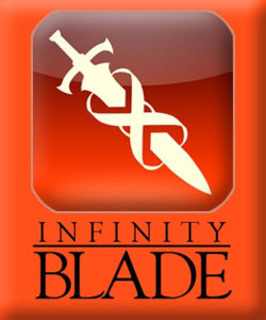ChAIR has done it again! Infinity Blade brings the loneliness of Ico to a fighting game, creating a new gold standard.
Immersive Experience: Stands next to greats like Ico and LIMBO in terms of presenting a lonely, austere world that's incredibly compelling. Visuals and Musical Score are astounding.
Masterful Fighting Game: with simple controls, Infinity Blade puts its focus on the experience of play over that of performative skill, and yet skill is crucial to victory
Generation after Generation: Experience Points distribute to all gear to level them, when you die your descendants come to avenge your death, with all of your gear and stats intact.
Enemies tend to Repeat Themselves, making them Easy to Read: there seems to be only a few enemy "types", which makes the game easier than need be
- - - -
ChAIR Entertainment has done it again! The enigmatic game company that delivered Shadow Complex and is working on a game based on the Ender series of sci-fi novels (by Orson Scott Card) has delivered once again on it's mission concerning "narrowing the gap between the artistic ideal and its commercial manifestation."
[see www.chairentertainmentgroup.com/company/about, secret fact, the name Chair comes from their company mission, based on Plato]
Infinity Blade certainly narrows this gap. It's genre-breaking approach to play is certainly special, and delivers an experience that few contemporary games can match. While it might seem reasonable to reduce Infinity Blade to a simple fighting game (in which case, it's mediocre), ChAIR has done well to focus on the experience of play which elevates the mundane into the celestial.
The premise of Infinity Blade which drives the game forward is that you play a generation of fighters who have been honed by the "deathless" God King to become great warriors. While eventually you'll challenge the God King himself (and do so many times, likely) and even have the opportunity to join him. The goal of the game, however, is to defeat the deathless at your own hands.
And deathless is an apt description both of the God King and his minions, as well as your character. When you inevitably fall in battle, your offspring rise to take your place and avenge your death. While this starts you at the beginning of the towering castle again, you'll retain all of your stats and equipment, which you'll need to face the newly-leveled enemies. You'll gain experience (and gold) from fighting, which is distributed simultaneously to your overall level, and divided as well among all of your equipment, which when you Master grants additional points for leveling your character. Points may be placed into health, attack, shield, and magic; your build then able to reflect the approach to combat that works for you.
Infinity Blade, however, is clearly not an RPG. If anything, it's closest to games like Mike Tyson's Punch Out, which despite the odd comparison, gives an appropriate expectation for the play, which consists essentially of a series of one-on-one fights. The controls are simple (dodge left and right, block, attack, magic) which works well on the iphone for sure. It also boils down the play to a set of clear moves and options. Combat then consists of parrying, blocking, or dodging blows, and countering with your own especially when the opponent is "stunned" from a series of misses or blocks. As in Punch Out, each opponent has a set of moves which can be "read" by close observation (for instance, is the angle opponent's sword side-swipe indicating that you should dodge left or right). By learning your opponents, and leaving up, you'll gain the skills needed to take the fight all the way to the top of the tower and challenge the God King himself.
And yet so much of what makes Infinity Blade a rarity is what isn't contained in the combat itself. From the outset, you feel as an invader in a nearly empty castle, faced simply with a few robust denziens who stand in your way. The entire experience is one of loneliness and stark beauty: the bridge, the gateway, the hanging tree, the tower, each scene is breathtaking to behold. This is certainly in part because of the wonderful musical score, which adds a sense of mystery to the locations, as well as adventure. When a monster 3 or 4 times your size gets in your face, and hangs over you with an axe the size of your body, it's a powerful moment again and again. But the other part of this is the staging: each scene's "camera" or view is rarely if ever a straight take. Rather, each "scene" comes at an angle which accentuates the mood. The earth's horizon bends well beyond the typical, the stairway fight takes into account the railings and dizzying height, each set is captured for maximum emotional power, which is another debt paid to Ico here. And yet despite the powerful loneliness, there is a strong sense in which your character belongs here with these monsters. There is destiny in the works, and it's power can be felt clearly with each step.
And if there is a mistep, it belongs to the combat itself. Monsters tend to use the same moves far too often and can be found in multiple enemies. The learning curve, then, is steep at first, but rounds out after a few generations of play. Increased enemy versatility would not simply makes combat harder, but would stretch out the learning curve so that the player doesn't become so comfortable. Maintaining player anxiety would serve to increase the emotional impact, especially to a "finished" game.
Infinity Blade then is an amazing experience, not simply an amazing game, and might be considered so despite it's relatively simplistic approach to combat. By elevating a series of fights into an episodic generational quest to defeat the God King, ChAIR breaks the molds and crafts the clay into an experience that is sadly far too few and far between.

